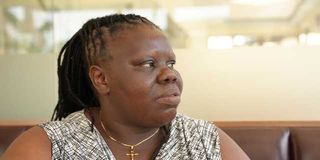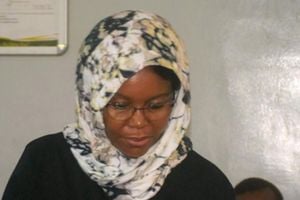
Faith Omollo, a Kenyan businesswoman, who was imprisoned in Malaysia between 2016 and 2024 after being duped into transporting drugs.
Not all job offers abroad are life-changing opportunities, as a mother who returned to Kenya on December 6 after spending eight years in a Malaysian prison has painfully discovered. Faith Omollo Oloo, a mother of four, was initially supposed to be hanged in the Asian country.
She returned to Kenya thanks to an appeal she won in late 2024, after convincing an appellate court that she was an innocent carrier of a bag, which had been secretly stashed with nearly a kilo of a prohibited drug beneath its seams.
With the acquittal, she was freed from death row and broke free from the heavy chains that had once bound her hands and legs whenever she stepped outside her cell. Now back in Kenya, she is determined to start a new chapter in her life. However, she says her wrists are still not fully healed from the lasting effects of the chains’ weight.
Her reason for speaking with the Nation, she says, is to warn the public about individuals who may present themselves as conduits for overseas jobs, while their real intention is to recruit mules for drug trafficking.
“I don’t want any person to lead that kind of life again (in prison), even my worst enemy,” she says.
When she travelled for her “dream” job of being a wholesale trader, she left behind her husband, a businessman in Kisumu, children and a second-hand clothes (mitumba) business she was running.

Faith Omollo, a Kenyan businesswoman, who was imprisoned in Malaysia between 2016 and 2024 after being duped into transporting drugs.
She had been promised a salary of 3,000 Malaysian ringgits (about Sh85,000 in today’s rates) per month. She had no idea the trouble she was getting herself into.
“Had I been wiser, I could have avoided going to work outside. I could just be in the country, to suffer inside my country, earning the small money that I was earning. When I was here in this country, I was not a housewife. I was selling second-hand clothes, from which I was getting a little money every day,” she says, regret influencing the timbre of her voice.
It all started when Faith linked up with a friend who told her there was an overseas job.
She badly wanted a job because her family had taken a huge financial blow after their lastborn child, a boy, had undergone surgery to rectify twisted intestines. The surgery set the family back by about Sh380,000.
“My son had an operation, and I had high hospital bills. So, I needed money to pay. That is how I left my children with my husband then went to Malaysia,” says Faith.
The friend asked Faith to raise Sh200,000 for an air ticket, which she managed to do through borrowing and organising fundraisers.
Initially, the friend had linked her to a job in China. All the papers processed, they left Kenya for China. However, at a Hong Kong airport, they were deported back to Kenya because the jobs they were to take up did not exist.
Upon their return to Kenya, the friend suddenly changed the narrative to Malaysia.
But even before she went to Malaysia, Faith was shocked to learn that her destination was Nigeria, where the Kenyan friend lives with her Nigerian husband. On asking, the friend said that Faith needed a briefing.
“She told me, ‘Faith, you have to come to my house. I don’t want disappointment. I’m the one connecting you to the job in Malaysia. I just want to talk to your boss when you are together with me in my house,’” recalls the businesswoman.
She thought this was a plausible explanation, and off she left for Nigeria.
“When I reached the airport, she came and picked me up with her husband. We went to their house near the airport,” recalls Faith. “I stayed in their house for two days. On the third day, I started my journey to Malaysia.”
The woman’s house, she recalls, was the epitome of opulence and luxury. She ran a boutique in Nigeria.
On the eve of her flight to Malaysia, the Kenyan in Nigeria had Faith talk to the person who would be her ‘boss’.
They agreed that Faith would spend the first month at her boss’s house then get her own accommodation after earning her first salary.
“The boss repeated to me that I was going to be paid 3,000 Malaysian ringgits. I felt happy because I needed the money. I was happy to get work abroad. I thanked and praised God,” she says.
As the Kenyan and her Nigerian husband escorted her to the airport for her to fly to Malaysia, a conversation about a bag she was to carry with her suddenly came up.
“When we were almost entering the Nigeria airport, the husband, who was driving the car, said to my friend, ‘I heard you talking a lot of stories with your friend, Faith, but I’ve not yet heard you telling Faith about the parcel which she’s going to give my sister when she arrives in Malaysia.’ My friend told me at the back, ‘My sister-in-law gave birth. I was supposed to go to Malaysia, but because you are the one who is going first, I will give you some items for a newborn baby to take to her. She will pick it up at the airport.’
“So, I said ‘yes’ because I didn’t know anything totally. I didn’t know that that was how they were dealing with people,” narrates Faith.
It was a maroon suitcase.
Faith recalls that the Kenyan friend carried the suitcase at the Nigerian airport as she carried her bags.
“At the airport, the bag was checked. Inside were beautiful items for newborn babies. There were also two wigs, two pairs of trousers, and two jackets for her sister-in-law. So, I started my journey for Nigeria to Malaysia,” says Faith.
Things came to a head at an airport in Malaysia when an alarm sounded from a machine that her bags were put through. Drugs had been detected in the maroon suitcase.
As it later emerged, a compartment stitched inside the suitcase neatly hid 900 grammes of an unrefined salt-like drug, which she understands was ketamine — a controlled substance. It produced 600 grammes upon being refined.
“The suitcase was carrying baby items, but the drugs were hidden inside the suitcase. So, you couldn’t even notice that it had drugs,” says Faith.
That is how her ordeal in the hands of Malaysian law enforcers started. Faith made a call to her friend in Nigeria, who had a lengthy conversation with the customs official who was handling her case.
She recalls that the last message from the officer to her friend in Nigeria was: “If you really know that you did not give this woman a bag with drugs inside, please come to Malaysia.”
The woman never went to Malaysia. And she has not communicated with Faith since.
The first court that tried Faith did not buy her argument that she carried the suitcase without knowing what was inside. And so, she was slapped with a death sentence.
It was a tough development, and she remembers breaking down in court. Even officials from the Kenyan embassy, who were helping her with translating court proceedings, broke down.
When she informed her husband about the sentence, he could also not control himself.
“Personally, I was praying. I knew that no one else could help me but God,” she said.

Father John Wotherspoon, an Australian Catholic priest and a prison chaplain, during an interview on January 1, 2025, at Methodist Resort. The Priest is a campaigner against the recruiting of Africans to carry drugs to Asia and elsewhere in the world.
According to Fr John Wotherspoon, an Australian priest who is a prison chaplain and who has been working towards dismantling the networks that dupe women into being drug mules in Asia, more than 40 Kenyans have found themselves in prisons in Malaysia, Hong Kong and other Far Eastern territories through trickery.
Fr Wotherspoon, who facilitated Faith’s travel back to Kenya, says the government-issued lawyer Faith was given did not do a good job in the first case. It was thanks to another lawyer that she hired for her appeal, he says, that she was able to secure her freedom.
“He did things that the first lawyer failed to do,” he says. “For example, he obtained CCTV footage of when she was arrested. When she was arrested and told she had drugs, she was startled… which indicated she did not know she had drugs.”
Faith says that since her arrest in 2016, other Kenyans have been arrested after falling victim to the same ploy. They include a 74-year-old woman who was nabbed in 2017.
“Now she’s on death row in Malaysia. She has been rejected by all judges (on appeal). She’s awaiting pardon from the king,” says Faith, saying that there is also a likelihood of the septuagenarian being hanged.
In the eight years and four months that she was behind bars, she saw some of her fellow inmates led to the hanging room in the prison, never to come back.
“They hang people. They don’t inject; they hang you,” she says.
In 2023, she adds, two Kenyans and one Ugandan were arrested in Malaysia after being duped by the same Nigeria-based woman who tricked her.
At the interview with Faith is another Kenyan woman, who chooses to remain anonymous. The mother of one left a Hong Kong prison in November 2024 after being locked up for nearly nine years.
She used to be a trader dealing in second-hand cutlery and claims that she met someone who convinced her she could get good stocks in Madagascar that would yield high profit margins.
She travelled to the island, only to have her passport detained. She was later forced to swallow sausage-sized pellets before being put on an aeroplane, she says. She was nabbed in Hong Kong, sickly and nauseated.
In court, she pleaded guilty and got a 21-year sentence for saving the court’s time. This was further reduced due to good behaviour. She is now trying to find her bearing in Kenya.
Faith, on the other hand, having stayed in prison for nearly a decade, came back to find her children all grown up. The eldest is 22 while the youngest is 16.
On the day she returned, her children mobbed her as they hugged and cried.
“I was crying because I forgot even my children. They are big now,” she says.
In calls that she used to make home, she never told her children that she was facing the death penalty. Only her husband knew.
To get money for calls, she had to sell the special meals they got. In Malaysia, she says, a prisoner buys items like soap and sanitary pads using their own means.
As she had no money, all she could do was sell her food rations. As such, she would call back home perhaps twice a year.
Faith now asks Kenyans to be extra vigilant in deals that have Nigerian connections.
“Be careful with Nigerians. Most of the people in prison (in Asia) were sent there by Nigerians,” says Faith.
“I want to tell fellow Kenyans to be careful when people volunteer to connect them with job opportunities out of the country,” she adds.









